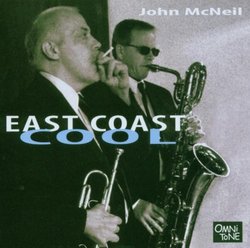It's Not Gerry, But It'll Do
Sam E. Polson | Honolulu, HI USA | 03/19/2006
(4 out of 5 stars)
"Any musician who forms a pianoless quartet with a baritone sax and trumpet as the front line is inevitably inviting comparisons with the famed Gerry Mulligan-Chet Baker group of the early `50s. Trumpeter John McNeil readily admits that and faces up to the challenge without hesitation. Although there is an inherent bari-trumpet blend to the McNeil quartet, astute listeners would never mistake this band for the one that blazed the trail for the so-called West Coast "cool school" over a half-century ago.
For one thing, leader McNeil doesn't share the round, breathy Chet Baker sound. His attack is more fiery with a sharper edge. Baritone saxist Allan Chase, while closer to Mulligan's loping approach than McNeil is to Baker's, takes the group closer to the brink of the "free jazz" genre. John Hebert on bass and Matt Wilson on drums play a more prominent role than Mulligan's more subdued timekeepers did.
Leader McNeil - who also composed nine of the release's 12 tracks - explains the CD's title this way: "The word `cool' used to imply a kind of laid-back attitude, an understated way of playing. `East Coast Cool' implies music with a lot more East Coast edge and intensity, but with the same West Coast economy of expression."
The intensity he speaks of becomes apparent early-on as the group kicks off the disc with the rhythmically fluctuating "Deadline." Following pieces vary all over the lot from the gentle "Brother Frank" to a tensely plotted "A Time to Go" and on to the irony of a pianoless ensemble rendering "Schoenberg's Piano Concerto" sans the 12-tone scale. The only tune on the bill that can be openly associated with the Mulligan group is "Bernie's Tune" - one of their most-played staples. But, oh what a difference in this one! McNeil's arrangement states the familiar melody in an eye-opening, jagged pop and departs quickly for a free-style romp before returning to close it out.
If you're a dyed-in-the-wool Mulligan-Baker fan, this release may be difficult to assimilate. If you're open for some inventive improvised music, however, you should give this one a ride."
Mulligan meets Ornette
Troy Collins | Lancaster, PA United States | 01/11/2006
(4 out of 5 stars)
"On "East Coast Cool," trumpeter John McNeil set out to re-interpret the classic West Coast cool jazz sound of Gerry Mulligan and Chet Baker's piano-less quartets. McNeil's career stretches back almost three decades, playing alongside Horace Silver, Slide Hampton, and The Thad Jones/Mel Lewis Orchestra as well as Mulligan himself.
After re-arranging some of Mulligan's tunes for a tribute concert in his honor, McNeil decided to expand that project into a re-contextualization of this seminal music. As a former member of Mulligan's group in the 1980s, McNeil comes at this material with both knowledgeable authority and respectful appreciation. What he does with it however, is the sort of thing his former boss wouldn't have dreamed of.
Based in New York, (hence the title) McNeil recruited a sympathetic cast of local collaborators. Drummer Matt Wilson is one of today's finest intuitive accompanists and bassist John Hebert is quickly becoming a ubiquitous presence on the scene. Saxophonist Allan Chase concentrates solely on baritone for this session, ostensibly filling Mulligan's shoes while the leader plays Baker's part. But McNeil's quartet stretches out into areas their dedicatees would likely never have dared tread. McNeil has found kindred spirits to ply his magic, and the results are impressive.
While these tunes are thematically inspired by the classic Mulligan-Baker quartets, all but two are McNeil originals, written in the restrained, but harmonically rich lyricism of West Coast cool jazz. Only "Bernie's Tune" and "GAB" are covers. But this is forward thinking, open-ended and malleable music, not rigid traditionalism. McNeil has established rules here, rules made to be bent, but not broken. Drummer Matt Wilson and bassist John Hebert are given free reign to vary the meter, rhythm and flow of the pieces, most notably on "Delusions" and especially so on their radical cover of "Bernie's Tune." Metric modulation and rubato tempos take the place of Mulligan's requirement of strict, straight-ahead time-keeping. Employing a standard device, "Internal Hurdles" features the front line trading fours, albeit over a pulse driven tempo, no exact time signature is enforced, swing is implied, not overstated. Chordal structures are insinuated and loosely applied, but never enforced as limitations. "A Time To Go" and "Wanwood," while structurally and harmonically unfettered, are lyrically gorgeous ballads that wouldn't sound out of place in the repertoire of either Baker or Mulligan.
Although the quartet adopts the patented cool jazz harmonies and melodies espoused by the masters, they are never limited by them. Baritone saxophonist Allan Chase honks and brays when the mood suits and McNeil's timbre bends under the weight of his conviction to break from accepted tonality to embrace the dissonant spaces between notes. For example, "Delusions" alternates a slinky noir groove with a spastic angular bop riff, McNeil's trumpet solo gradually building in intensity until his cathartic split tones blend with Wilson's increasingly frenzied press rolls. The ensemble snaps back into action for a sprightly vamp to underpin Chase's fleet baritone solo. With impressive melodic dexterity, Chase delivers precision lines that belie the cumbersome nature of the big horn.
Enjoyably accessible yet intriguingly innovative, McNeil and his quartet have taken Mulligan and Baker's piano-less quartet inspired music and drawn an overt parallel to Ornette Coleman's piano-less quartet innovations of the same time period, building a conceptual link between the two."

